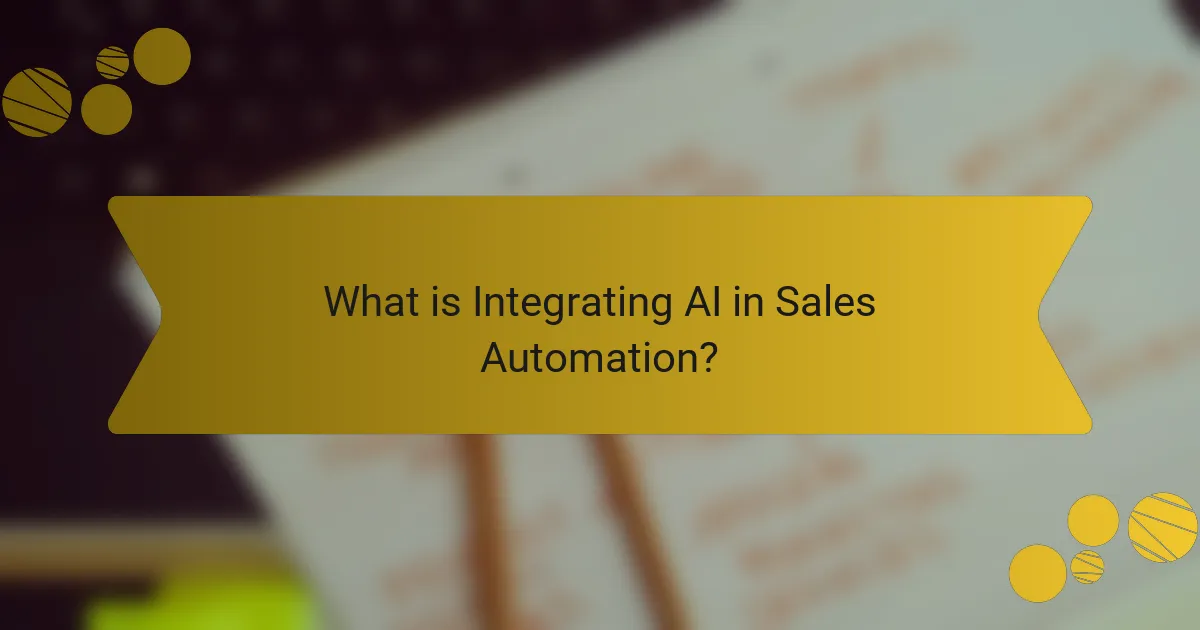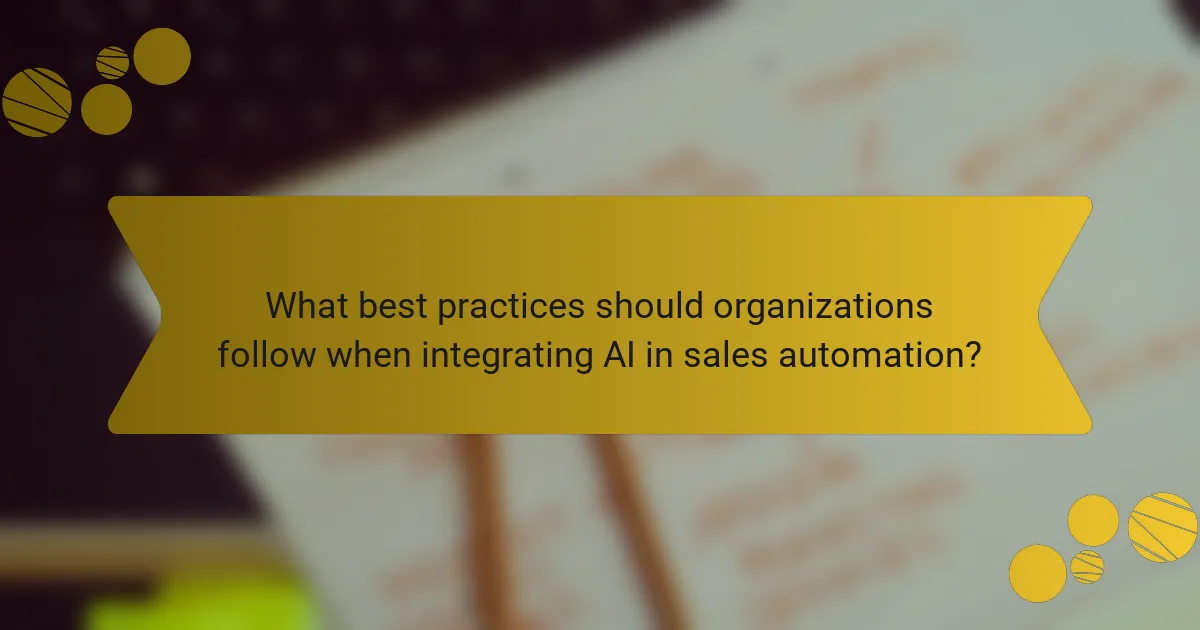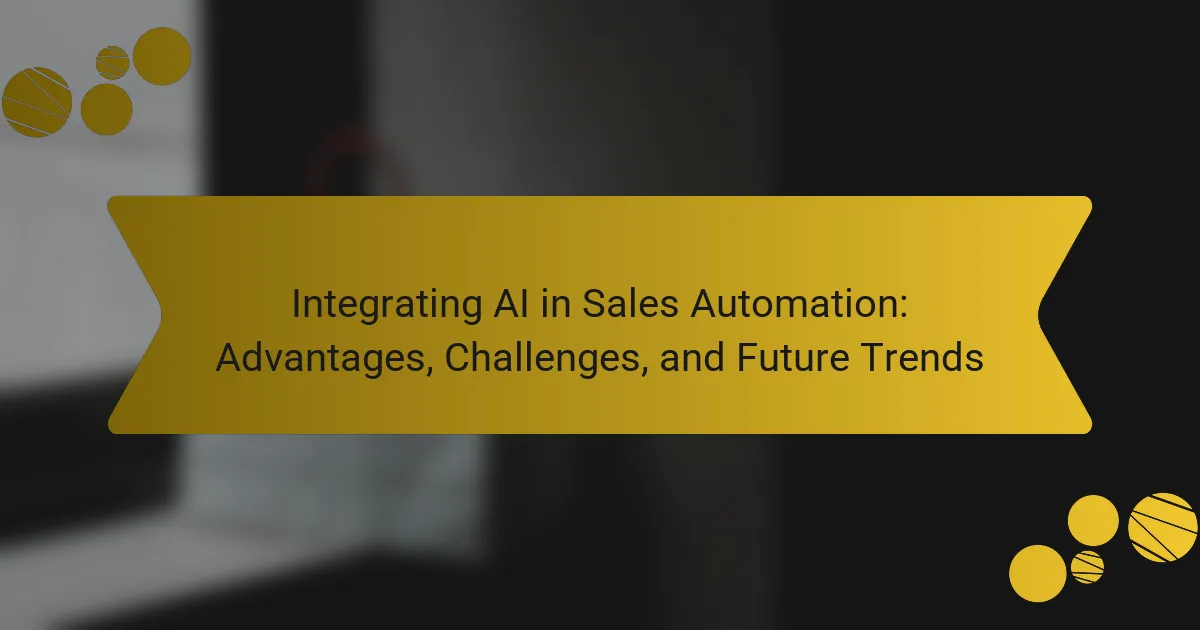Integrating AI in sales automation involves the use of artificial intelligence technologies to enhance sales processes by automating tasks such as lead scoring and data entry. This integration leads to increased efficiency, improved decision-making through data analysis, and personalized customer interactions that can boost conversion rates. Future trends indicate a focus on greater personalization, enhanced predictive analytics, and improved customer service through AI-driven tools. Best practices for successful integration include defining clear objectives, investing in quality data management, ensuring team training, maintaining transparency, and complying with data privacy regulations. Overall, leveraging AI in sales can significantly increase productivity and transform traditional sales methods into data-driven strategies.

What is Integrating AI in Sales Automation?
Integrating AI in sales automation refers to the incorporation of artificial intelligence technologies into sales processes. This integration enhances efficiency by automating repetitive tasks such as lead scoring and data entry. AI algorithms analyze customer data to provide insights and predictions, improving decision-making. According to a report by McKinsey, companies using AI in sales can increase their productivity by up to 30%. AI tools can also personalize customer interactions, leading to higher conversion rates. Overall, this integration transforms traditional sales methods into data-driven strategies.
How does AI enhance sales automation processes?
AI enhances sales automation processes by streamlining tasks and improving efficiency. It automates repetitive activities such as lead scoring and follow-up emails. This allows sales teams to focus on high-value interactions. AI analyzes customer data to identify trends and preferences. This insight enables personalized marketing strategies. Moreover, AI-powered chatbots provide instant customer support. They handle inquiries 24/7, improving customer satisfaction. According to a study by McKinsey, companies using AI in sales see a 10-20% increase in sales productivity. Thus, AI significantly boosts the effectiveness of sales automation.
What are the key technologies involved in AI-driven sales automation?
Key technologies in AI-driven sales automation include machine learning, natural language processing, and predictive analytics. Machine learning algorithms analyze customer data to identify patterns and improve decision-making. Natural language processing enables automated communication with customers through chatbots and virtual assistants. Predictive analytics forecasts sales trends by analyzing historical data. These technologies enhance efficiency and accuracy in the sales process. According to a report by McKinsey, companies utilizing AI in sales can increase productivity by up to 20%.
How do these technologies interact with existing sales systems?
These technologies enhance existing sales systems by automating processes and providing data-driven insights. They integrate with Customer Relationship Management (CRM) systems to streamline lead management. AI algorithms analyze customer data to identify trends and predict purchasing behavior. This interaction improves targeting and personalization of sales strategies. Furthermore, chatbots and virtual assistants handle customer inquiries, reducing response times. Integration often involves APIs that allow seamless data exchange between platforms. Studies show that companies using AI in sales see a 50% increase in leads. This quantifiable improvement validates the effectiveness of these technologies in existing sales frameworks.
What advantages does integrating AI in sales automation provide?
Integrating AI in sales automation provides enhanced efficiency and accuracy in sales processes. AI algorithms can analyze vast amounts of data quickly, allowing for better lead scoring and targeting. This leads to increased conversion rates as sales teams focus on high-potential leads. AI also automates repetitive tasks, freeing up sales representatives to engage in more meaningful interactions. According to a study by McKinsey, companies that leverage AI in sales can see productivity gains of 20% to 30%. Additionally, AI-driven insights help in personalizing customer interactions, leading to improved customer satisfaction and loyalty. Overall, the integration of AI streamlines operations and drives better sales outcomes.
How does AI improve sales forecasting accuracy?
AI improves sales forecasting accuracy by analyzing vast amounts of data quickly and identifying patterns. It utilizes machine learning algorithms to predict future sales trends based on historical data. AI can incorporate various data sources, such as market trends, customer behavior, and economic indicators. This comprehensive analysis leads to more reliable forecasts. Research shows that companies using AI for sales forecasting can achieve up to 30% greater accuracy compared to traditional methods. By continuously learning from new data, AI models adapt to changes in the market, further enhancing their predictive capabilities.
What role does AI play in lead generation and qualification?
AI enhances lead generation and qualification by automating data analysis and improving targeting. It processes large datasets to identify potential leads based on behavior and demographics. AI algorithms can score leads based on their likelihood to convert. This scoring helps sales teams prioritize their efforts effectively. According to a study by Salesforce, companies using AI for lead generation saw a 50% increase in qualified leads. AI tools can also personalize outreach, increasing engagement rates. Furthermore, AI-driven chatbots can interact with leads in real-time, gathering information for qualification. These advancements streamline the sales process and improve overall efficiency.
How can AI enhance customer relationship management?
AI can enhance customer relationship management by automating data analysis and personalizing customer interactions. It enables businesses to analyze customer data efficiently. This leads to insights that help tailor marketing strategies. AI can predict customer behavior based on historical data. For instance, a study found that companies using AI-driven CRM saw a 30% increase in customer engagement. AI chatbots provide 24/7 customer support, improving response times. Machine learning algorithms can identify trends in customer feedback. This allows businesses to adapt their services proactively. Overall, AI streamlines processes and fosters better customer relationships.
What challenges arise from integrating AI in sales automation?
Integrating AI in sales automation presents several challenges. Data quality is a significant concern. Inaccurate or incomplete data can lead to poor AI performance. Resistance to change is another challenge. Sales teams may be hesitant to adopt new technologies. Integration with existing systems can also pose difficulties. Compatibility issues may arise when merging AI tools with legacy software. Additionally, there are concerns about data privacy and security. Companies must ensure compliance with regulations like GDPR. Finally, the cost of implementation can be high. Organizations need to invest in technology and training to realize the benefits of AI.
What are the common barriers to AI adoption in sales teams?
Common barriers to AI adoption in sales teams include lack of data quality, insufficient training, and resistance to change. Many sales teams struggle with poor data quality, which hampers AI’s effectiveness. Insufficient training on AI tools leads to underutilization and frustration. Resistance to change stems from fear of job displacement and skepticism about AI’s benefits. Additionally, high implementation costs can deter teams from pursuing AI solutions. According to a survey by McKinsey, 70% of organizations cite these barriers as significant challenges in AI adoption.
How does data privacy impact the use of AI in sales automation?
Data privacy significantly impacts the use of AI in sales automation. Strict data privacy regulations, such as GDPR and CCPA, require businesses to handle customer data responsibly. Non-compliance can lead to severe penalties, affecting companies’ willingness to implement AI solutions. AI systems often rely on large datasets to learn and improve. Limited access to data due to privacy concerns can hinder the effectiveness of these systems. Furthermore, customers are increasingly aware of their data rights. This awareness can lead to reluctance in sharing personal information, which is essential for personalized sales strategies. A survey by the International Association of Privacy Professionals found that 70% of consumers are concerned about data privacy. This concern can lead to decreased trust in companies that utilize AI for sales, impacting customer relationships. Therefore, businesses must balance leveraging AI’s capabilities with respecting data privacy to maintain compliance and customer trust.
How can organizations overcome these challenges?
Organizations can overcome challenges in integrating AI in sales automation by implementing strategic training programs. These programs should focus on educating employees about AI tools and their functionalities. Additionally, organizations should foster a culture of collaboration between sales and IT teams. This collaboration ensures smoother integration and troubleshooting of AI systems.
Investing in user-friendly AI solutions can also enhance adoption rates among sales personnel. Regular feedback loops can help identify issues early and adapt solutions accordingly. Furthermore, organizations should prioritize data quality and accessibility to optimize AI performance. Studies show that companies with high-quality data see a 70% increase in AI effectiveness. By addressing these areas, organizations can successfully navigate the challenges of AI integration in sales automation.
What strategies can be implemented to ensure successful AI integration?
Successful AI integration requires a strategic approach. First, organizations should assess their current processes and identify areas where AI can add value. This involves understanding specific business needs and aligning AI capabilities accordingly. Next, investing in training and development for staff is essential. Employees must be equipped with the knowledge to utilize AI tools effectively.
Additionally, establishing clear communication channels is vital. This ensures that all stakeholders are informed about AI initiatives and their expected outcomes. Regularly monitoring and evaluating AI performance is also critical. This helps in making necessary adjustments and optimizing systems for better results.
Lastly, fostering a culture of innovation can encourage experimentation with AI solutions. Companies that embrace change are more likely to succeed in integrating AI technologies. According to a McKinsey report, organizations that prioritize these strategies see a higher success rate in AI adoption.
How can training and support improve AI adoption in sales teams?
Training and support enhance AI adoption in sales teams by increasing proficiency and confidence in using AI tools. Effective training programs equip team members with the necessary skills to leverage AI for lead generation and customer insights. Support mechanisms, such as ongoing coaching and resources, reinforce learning and address challenges in real-time. Research indicates that organizations with structured training see a 30% higher adoption rate of new technologies. Additionally, continuous support fosters a culture of innovation and adaptability. This ultimately leads to improved sales performance and better decision-making.

What are the future trends in AI and sales automation?
Future trends in AI and sales automation include increased personalization, enhanced predictive analytics, and improved customer interactions. AI will enable businesses to tailor their sales strategies to individual customer preferences. Predictive analytics will allow sales teams to forecast customer behavior more accurately. Automation tools will streamline repetitive tasks, freeing up time for sales professionals to focus on relationship building. Additionally, AI-driven chatbots will enhance customer service by providing instant responses. The integration of AI with CRM systems will improve data management and insights. According to a report by McKinsey, companies that effectively use AI in sales can increase their sales productivity by 20% or more.
How is AI expected to evolve in the sales automation landscape?
AI is expected to evolve in the sales automation landscape by enhancing predictive analytics and personalization. Advanced algorithms will analyze customer data more effectively. This will lead to better-targeted sales strategies. Machine learning will automate repetitive tasks, freeing sales teams for higher-value activities. AI-driven chatbots will improve customer interactions and response times. Natural language processing will enable more nuanced understanding of customer needs. Integration with CRM systems will streamline data management. According to a 2021 report by McKinsey, companies leveraging AI in sales saw a 10-20% increase in sales efficiency.
What emerging technologies are likely to influence sales automation?
Artificial intelligence (AI), machine learning (ML), and natural language processing (NLP) are emerging technologies likely to influence sales automation. AI enhances data analysis, enabling personalized customer experiences. ML algorithms predict customer behavior, improving lead scoring and targeting. NLP facilitates better communication through chatbots and virtual assistants. These technologies streamline workflows and increase efficiency in sales processes. For instance, Salesforce reported a 30% increase in sales productivity through AI integration. Furthermore, Gartner predicts that by 2025, 75% of sales organizations will use AI to enhance customer interactions.
How will customer expectations shape the future of AI in sales?
Customer expectations will significantly influence the future of AI in sales. As customers demand personalized experiences, AI systems will need to analyze data to tailor interactions. This shift will require enhanced algorithms that can predict customer preferences. Furthermore, customers expect faster responses, pushing AI to optimize communication channels. The integration of AI chatbots for immediate assistance is a direct response to this expectation. According to a study by McKinsey, 70% of consumers expect companies to understand their needs and expectations. This statistic highlights the necessity for AI to evolve in understanding customer behavior. Ultimately, businesses that adapt their AI strategies to meet these expectations will likely see improved customer satisfaction and loyalty.
What industries are likely to see the most significant impact from AI in sales automation?
Retail, finance, and healthcare are industries likely to see significant impacts from AI in sales automation. Retail will benefit from personalized customer experiences and inventory management. Finance can enhance lead generation and customer relationship management with AI tools. Healthcare may improve patient engagement and streamline administrative tasks through automation. According to a report by McKinsey, AI can potentially increase productivity in these sectors by 30% or more.
How are different sectors adopting AI for sales automation?
Different sectors are adopting AI for sales automation by integrating machine learning and predictive analytics. Retail companies use AI to personalize customer experiences and optimize inventory management. Financial services employ AI for lead scoring and risk assessment, enhancing decision-making processes. Healthcare organizations implement AI to streamline patient interactions and improve service delivery. Manufacturing sectors leverage AI for demand forecasting and supply chain optimization. According to a 2022 McKinsey report, 50% of companies in various sectors have adopted AI in at least one business function, indicating a significant trend towards automation in sales processes.
What unique challenges do specific industries face with AI integration?
Specific industries face unique challenges with AI integration due to their distinct operational requirements. For example, the healthcare sector struggles with data privacy and regulatory compliance. These regulations, such as HIPAA in the United States, dictate strict guidelines for patient data handling. In manufacturing, integrating AI into legacy systems poses significant technical hurdles. Many manufacturers rely on outdated technology that is incompatible with modern AI solutions. Retail industries face challenges in managing customer data effectively. Personalization requires accurate data analysis, which can be difficult to implement. Financial services must contend with algorithmic bias, which can lead to unfair lending practices. This bias can stem from historical data that reflects societal inequities. These challenges highlight the need for tailored AI solutions in each industry.

What best practices should organizations follow when integrating AI in sales automation?
Organizations should follow several best practices when integrating AI in sales automation. First, they must define clear objectives for AI implementation. This ensures alignment with overall business goals. Next, organizations should invest in quality data collection and management. High-quality data is crucial for effective AI performance. Additionally, they must ensure team training on AI tools. Proper training enhances user adoption and maximizes the technology’s benefits.
Organizations should also prioritize transparency in AI decision-making processes. This builds trust among sales teams and customers. Furthermore, they should regularly evaluate AI performance against set KPIs. Continuous assessment allows for timely adjustments and improvements. Lastly, organizations must maintain compliance with data privacy regulations. Adhering to legal standards protects customer information and mitigates risks.
How can businesses ensure effective implementation of AI tools?
Businesses can ensure effective implementation of AI tools by establishing clear objectives and aligning them with their overall strategy. This involves identifying specific use cases where AI can add value. Additionally, investing in employee training is crucial. Educated staff can better adapt to and utilize AI technologies.
Moreover, businesses should prioritize data quality and accessibility. High-quality data is essential for AI tools to function effectively. Implementing a robust data management system can facilitate this. Regularly evaluating AI performance is also important. Assessing outcomes helps in refining AI applications and strategies over time.
Collaboration between IT and business units enhances implementation success. This ensures that technical capabilities align with business needs. Lastly, seeking feedback from users can provide insights for improvement. Engaging users fosters a culture of continuous enhancement.
What metrics should be used to measure the success of AI in sales automation?
Key metrics to measure the success of AI in sales automation include conversion rates, sales cycle length, and lead response time. Conversion rates indicate the percentage of leads that become customers, reflecting AI’s effectiveness. Sales cycle length measures the time taken to close deals, showcasing efficiency improvements. Lead response time assesses how quickly sales teams engage with leads, which is crucial for maintaining interest. Additionally, customer acquisition cost (CAC) and return on investment (ROI) are vital. CAC tracks the expense involved in gaining new customers, while ROI evaluates the financial return from AI investments. These metrics provide a comprehensive view of AI’s impact on sales performance.
How can continuous improvement be achieved with AI-driven sales processes?
Continuous improvement in AI-driven sales processes can be achieved through data analysis and feedback loops. AI systems analyze sales data to identify patterns and trends. This analysis enables businesses to understand customer behavior better. Regular updates to AI algorithms improve accuracy in predictions. Implementing feedback from sales teams enhances the system’s relevance. Training AI on new data keeps it aligned with market changes. Companies that use AI-driven insights can adapt strategies swiftly. Research shows that organizations using AI in sales see a 50% increase in leads.
What common pitfalls should organizations avoid during AI integration?
Organizations should avoid lack of strategy during AI integration. A clear roadmap is essential for success. Without it, projects may lack direction and fail to meet objectives. Additionally, organizations should not underestimate the importance of data quality. Poor data can lead to inaccurate AI predictions and decisions. Another pitfall is neglecting employee training. Employees must understand AI tools to utilize them effectively. Failing to involve stakeholders can also hinder integration. Engagement from all levels ensures buy-in and reduces resistance. Lastly, organizations should avoid over-reliance on AI. Human oversight is crucial for interpreting AI outputs and making informed decisions.
How can businesses mitigate risks associated with AI implementation?
Businesses can mitigate risks associated with AI implementation by conducting thorough risk assessments. This involves identifying potential vulnerabilities in AI systems. Regular audits can help monitor AI performance and compliance. Establishing clear ethical guidelines is essential to ensure responsible AI use. Training employees on AI technologies reduces the risk of misuse. Collaborating with AI experts can enhance understanding and implementation strategies. Implementing robust data security measures protects sensitive information. Lastly, creating contingency plans prepares businesses for unforeseen challenges during AI integration.
What role does leadership play in successful AI adoption in sales?
Leadership is crucial for successful AI adoption in sales. Effective leaders set a clear vision for AI integration. They foster a culture that embraces innovation and change. Leaders also provide necessary resources and training for their teams. Research indicates that companies with strong leadership see a 70% higher success rate in AI initiatives. Moreover, leaders can address resistance by communicating the benefits of AI. Their involvement ensures alignment between AI strategies and business goals. Thus, leadership directly influences the effectiveness of AI deployment in sales.
Integrating AI in sales automation is the primary focus of this article, which examines how artificial intelligence enhances sales processes by automating repetitive tasks, improving efficiency, and providing data-driven insights. Key technologies such as machine learning, natural language processing, and predictive analytics play a significant role in transforming traditional sales methods into more effective strategies. The article also addresses the advantages of AI integration, including increased productivity and personalized customer interactions, while highlighting challenges such as data quality, resistance to change, and privacy concerns. Finally, it outlines best practices for successful AI implementation and explores future trends shaping the sales automation landscape.
